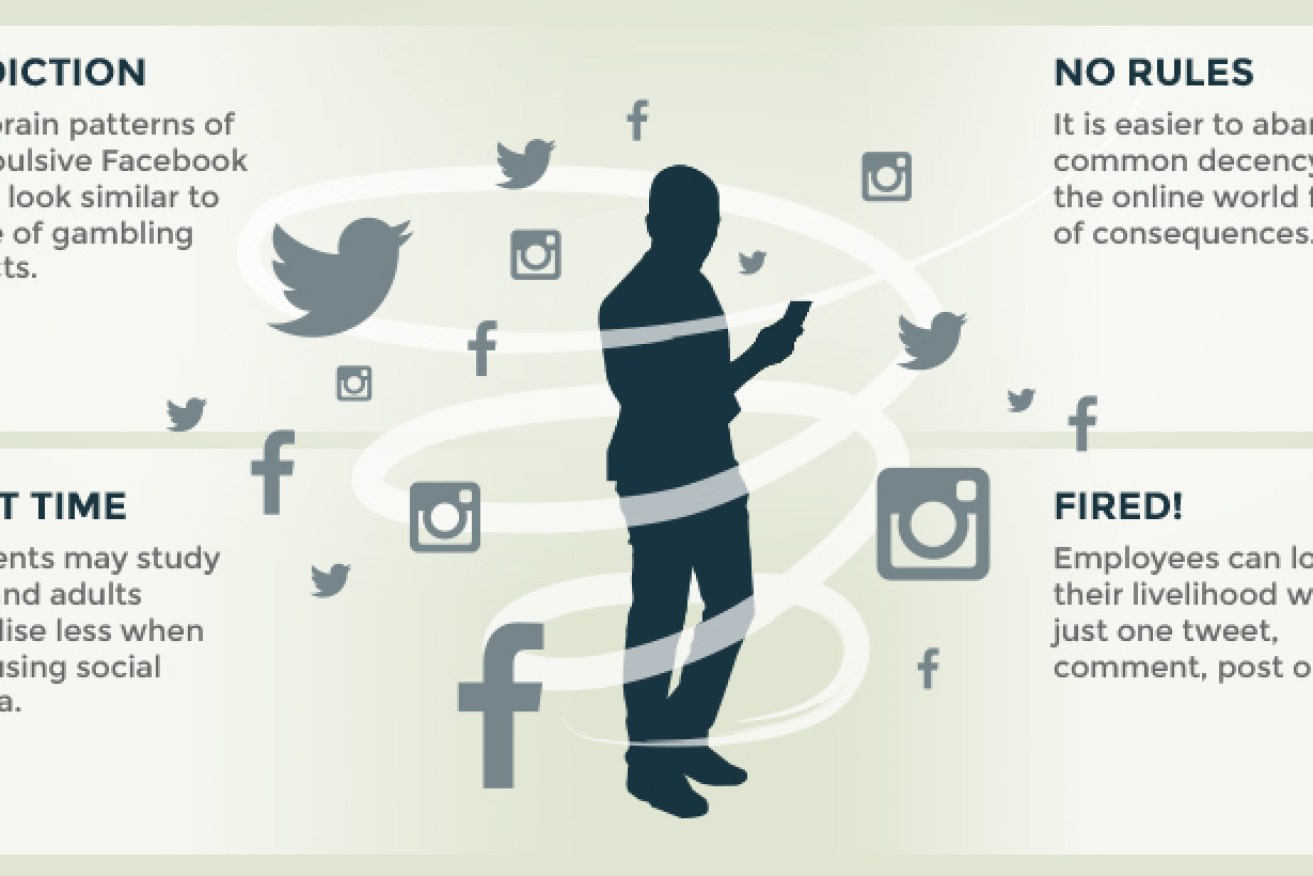This is what social media is really doing to you


Scientists now have a clearer picture of the harms of social media, thanks to new research.
In a meta-analysis published in Trends in Cognitive Sciences last week, German and US scientists reviewed the current scientific literature on a wide range of social media impacts, especially those on the brain and human social behaviour.
The social media statistics for Australia are staggering: more than 14 million Facebook users, over five million Instagram users, and almost 2.8 million Twitter users as of August this year.
• #FOMO leading to depression, anxiety for teenagers
• ‘Instafame’ advertising is simply ‘full of lies’
• Anyone can now search your Facebook posts

Excessive use of social media can warp our behaviour. Photo: Getty
“By releasing people from some of the environmental constraints that usually shape their behaviour, social media provides a wellspring of opportunity to understand the roots of our social behaviours and the extent to which they will be influenced by different environmental factors,” co-lead author Professor Diana Tamir said.
A neuropsychology expert from Monash University said that “excessive or inappropriate use” of these networking sites can have a negative impact on the functioning of our brains.
“The potential harms are only associated with excessive or inappropriate use, which may have negative consequences on reward and emotional systems, and thus evoke or exacerbate negative emotions, stress and feelings of low self-worthiness,” Associate Professor Antonio Verdejo-Garcia told The New Daily.
Internet addiction

Addictive use of social media might be similar to gambling. Photo: Getty
A 2014 study that used functional magnetic resonance imaging (MRI) to examine the neural mechanics of Facebook ‘addiction’ in 20 undergraduate students found they displayed brain patterns and brain region activation similar to those seen in drug and gambling addicts.
Although Professor Verdejo-Garcia urged caution when using the word ‘addiction’ in the context of social media, he conceded that internet addiction does indeed have similarities to substance addiction.
“It is true though that social media use share[s] some superficial characteristics with addiction, such as frequent stimulation of brain reward systems,” he said.
“However, this would be just one aspect of addiction, which is a complex disorder involving many other characteristics.”
Losing time

Lots of time on social media may reduce our contact with the real world. Photo: Getty
A 2013 paper released by the US National Bureau of Economic Research looked at the things people had stopped doing as a consequence of more time spent online and found there was a significant drop in time spent studying, particularly in young people aged between 15 and 19.
Unsurprisingly, the paper also noted a marked decrease in time people spent socialising offline, with a drop of five minutes per day on average between 2003 and 2011.
A definitive answer to whether social media use affects academic performance is still up in the air, as shown in two studies by Iowa State University internet researcher Associate Professor Reynol Junco published in 2011 and 2012, who found no relationship between time spent on Facebook and time spent studying, and no relationship between time spent on Facebook and student grades.
Don’t read the comments

News website Popular Science banished comments in 2013.
Many people are familiar with the uglier expletive-laden side of networking sites, where the absence of face-to-face interactions and a high level of anonymity allows users to freely swear and abuse others.
Two studies published in Journal of English Studies in 2012 and Computers in Human Behaviour in 2013 found that swearing played an integral role in social conformity on networking sites, particularly YouTube – swear words are “not inherently impolite” on these platforms.
The review authors also note that, unlike in our real ‘offline’ world where actions are met with consequences, the ‘online’ world is a place where social norms are continuously abandoned to such an extent that Facebook has a team dedicated to handling reports of abuse 24 hours a day, seven days a week.
You’re fired!
Losing your job due to a not-so-pleasant Facebook post about a work colleague has become a scary new reality, with employers often demanding their workers sign social media compliance contracts, according to the review’s authors.
Pre-interview vetting of social media profiles has also become “standard practice” and job recruitment agencies advising those looking to enter the workforce to make sure their online presence is either undetectable or clean.
But it gets better
There is some good news though, with multiple studies showing that Facebook can be greatly beneficial for a person’s self-esteem and well-being, especially in teenagers who are undergoing great social and emotional development.
For example, a study published in CyberPsychology and Behaviour in 2006 found that positive feedback on a teenager’s social media profile enhanced their self-esteem, whereas negative feedback had the expected opposite effect.
Young Australians are “more sensitive” to these effects, according to Monash University’s Assoc Prof Verdejo-Garcia.
“During adolescence we are more sensitive to social influences and that is true both for the offline and online social spaces.”










